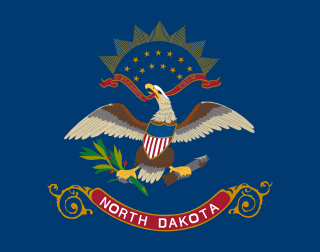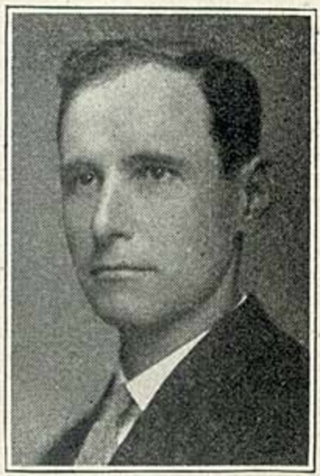
In the U.S. state of North Dakota, the agriculture commissioner, formerly known as the commissioner of agriculture, is an elected official who heads the North Dakota Department of Agriculture. The present commissioner is Doug Goehring, a Republican.
The North Dakota Public Service Commission is a constitutional agency that maintains various degrees of statutory authority over utilities, telecommunications, railroads, grain elevators, pipeline safety, and other functions in North Dakota.
In the U.S. state of North Dakota, the commissioner of labor, commonly referred to as the labor commissioner, is an appointed official who heads the North Dakota Department of Labor and Human Rights. The present commissioner is Nathan Svihovec.

The politics of North Dakota were shaped historically by early settlement by people from the Northern Tier, who carried their politics west ultimately from New England, upstate New York, and the Upper Midwest. The area and state also received numerous European immigrants and migrants, particularly during the era of opening up of former Native American lands for sale and settlement.
John A. Gray was a North Dakota public servant and politician .He served in two of the state's constitutional offices as the North Dakota State Treasurer from 1935 to 1938, and as the North Dakota Tax Commissioner from 1939 to 1952.
The following table indicates the party of elected officials in the U.S. state of North Dakota:

West Virginia's 2012 general elections were held on November 6, 2012. Primary elections were held on May 8, 2012.

Louis A. Arnold was an American schoolteacher, HVAC worker and Socialist politician from Milwaukee who served two terms (1915–1922) as a member of the Wisconsin State Senate representing the Milwaukee-based 7th Senate district.

The California state elections, November 2010 were held on November 2, 2010.

A general election was held in the U.S. state of North Dakota on Tuesday, November 2, 2010, with primary elections being held on June 8, 2010.

Elections in Alabama are authorized under the Alabama State Constitution, which establishes elections for the state level officers, cabinet, and legislature, and the election of county-level officers, including members of school boards.

The 2018 United States elections were held on Tuesday, November 6, 2018. These midterm elections occurred during Incumbent Republican President Donald Trump's first term. Although the Republican Party increased its majority in the Senate, unified Republican control of Congress and the White House was brought to an end when the Democratic Party won control of the House of Representatives in what was widely characterized as a "blue wave" election as Democrats also gained governorships, other statewide offices, and state legislative chambers.

A general election was held in the U.S. state of North Dakota on November 4, 2014. Five of North Dakota's executive officers were up for election as well as the state's at-large seat in the United States House of Representatives. Primary elections were held on June 10, 2014.

North Dakota held two statewide elections in 2016: a primary election on Tuesday, June 14, and a general election on Tuesday, November 8. In addition, each township elected officers on Tuesday, March 15, and each school district selected a date between April 1 and June 30 to hold their elections. This would have been the first election since the state legislature revoked the ability to use a student or military ID to satisfy state ID voting requirements, but a court ruling in August struck the down the provision, and the election was held under the 2013 rules.

Statewide elections in the U.S. state of North Dakota take place every two years. Most executive offices and all legislators are elected to four-year terms, with half the terms expiring on U.S. Presidential election years, and the other half expiring on mid-term election years.

North Dakota held two statewide elections in 2018: a primary election on Tuesday, June 12, and a general election on Tuesday, November 6. In addition, each township elected officers on Tuesday, March 20, and each school district held their elections on a date of their choosing between April 1 and June 30.

1959 Philadelphia's municipal election, held on November 3, involved contests for mayor, all seventeen city council seats, and several other executive and judicial offices. Citywide, the Democrats took majorities of over 200,000 votes, continuing their success from the elections four years earlier. Richardson Dilworth, who had been elected mayor in 1955, was re-elected over Republican nominee Harold Stassen. The Democrats also took fifteen of seventeen city council seats, the most seats allowed to any one party under the 1951 city charter. They further kept control of the other citywide offices. The election represented a continued consolidation of control by the Democrats after their citywide victories of the previous eight years.

Elections were held in Illinois on Tuesday, November 7, 1978.

The 2022 California elections took place on November 8, 2022. The statewide direct primary election was held on June 7, 2022.

North Dakota held two statewide elections in 2022: a primary election on Tuesday, June 14, and a general election on Tuesday, November 8. In addition, each township elected officers on Tuesday, March 15, and each school district would hold their elections on a date of their choosing between April 1 and June 30.